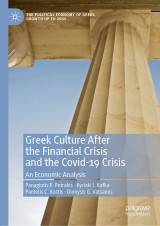Details

Greek Culture After the Financial Crisis and the Covid-19 Crisis
An Economic AnalysisThe Political Economy of Greek Growth up to 2030
|
64,19 € |
|
| Verlag: | Palgrave Macmillan |
| Format: | |
| Veröffentl.: | 29.08.2021 |
| ISBN/EAN: | 9783030810184 |
| Sprache: | englisch |
Dieses eBook enthält ein Wasserzeichen.
Beschreibungen
<p>This book studies the evolution in human thought, action, and behavior as a</p>
<p>result of the 2008 fi nancial crisis and the Covid-19 crisis. Through the presentation</p>
<p>and analysis of data, as recorded for at least a decade, and using the Greek</p>
<p>economy as a case study, the authors examine the changes in social and human</p>
<p>capital, increasingly risk-averse behavior, and changes in people’s general psyche</p>
<p>and economic action in Greek society and economy.</p>
<p>result of the 2008 fi nancial crisis and the Covid-19 crisis. Through the presentation</p>
<p>and analysis of data, as recorded for at least a decade, and using the Greek</p>
<p>economy as a case study, the authors examine the changes in social and human</p>
<p>capital, increasingly risk-averse behavior, and changes in people’s general psyche</p>
<p>and economic action in Greek society and economy.</p>
<p>Part I: The Basics of Cultural Background.- Chapter 1: Introduction.- Chapter 2: Human Needs and Actions.- Chapter 3: Behavioral Identity.- Chapter 4: The Big-Five Personality Characteristics.- Part II: Attitudes and Behaviors.- Chapter 5: Happiness, Life Satisfaction, Health and Political Self-Determination.- Chapter 6: Principles and Beliefs.- Chapter 7: Creativity, Incentives and Attitudes to Life.- Chapter 8: Social Behaviors.- Chapter 9: Voting Intention, Rationalism, Welfare State and Happiness.- Part III: Attitudes on Economic Policy.- Chapter 10 Economy and Economic Policy.- Chapter 11: Public Sector and Investments.- Chapter 12: State, Taxation and State Welfare.- Part IV: Risk Preferences, Loss Aversion and Rationality.- Chapter 13: Rationality and Loss Aversion.- Chapter 14: The Global Preference Survey: Attitudes towards Risk, Positive and Negative Reciprocity and Altruism.- Part IV: Social Behavior Hypothesis.- Chapter 15: Τhe Dipoles of Social Behaviors.- Chapter 16: Testing the Basic Social Modernization Theories.</p><br>
<p><b>Panagiotis E. Petrakis </b>is Professor in the Department of Economics at National</p>
<p>and Kapodistrian University of Athens, Greece, where he serves as Scientifi c</p>
Coordinator of Distance Education Training Programs. He was chairman of the<p></p>
<p>Department of Economics at National and Kapodistrian University of Athens from</p>
<p>2005 to 2009. He is the author of numerous scientifi c articles and monographs</p>
<p>and has extensive publications in recognized academic journals on economic</p>
<p>development, entrepreneurship, and cultural background.</p>
<p> </p>
<p><b>Kyriaki I. Kafka </b>is Adjunct Lecturer of Economics at the National and Kapodistrian</p>
<p>University of Athens / Department of Economics. She has published books and</p>
articles in distinguished academic journals including Journal of Comparative<p></p>
<p>Economics, Journal of Business Research and Journal of Innovation and</p>
<p>Knowledge, and her research interests include economic development and</p>
<p>growth, cultural economics, institutional economics, entrepreneurship, and</p>
<p>innovation.</p>
<p> </p>
<p><b>Pantelis C. Kostis </b>is Adjunct Lecturer of Economics at the National and</p>
<p>Kapodistrian University of Athens / Department of Economics and the Hellenic</p>
Open University, Greece. His research has been published in distinguished<p></p>
<p>international academic journals including Journal of Comparative Economics,</p>
<p>Journal of Business Research, Economic Modelling and the Journal of Socio-</p>
<p>Economics. He is also the co-author of several books regarding the European and</p>
<p>the Greek economy, and economic development and growth.</p>
<p> </p>
<p><b>Dionysis G. Valsamis </b>is a Researcher in the Department of Economics at the</p>
<p>National and Kapodistrian University of Athens, Greece. He is the co-author of</p>
two books and has published articles in academic journals. His research interests<p></p>
<p>include monetary policy, economic growth, and the implementation of economic</p>
policies in Europe.
<p>and Kapodistrian University of Athens, Greece, where he serves as Scientifi c</p>
Coordinator of Distance Education Training Programs. He was chairman of the<p></p>
<p>Department of Economics at National and Kapodistrian University of Athens from</p>
<p>2005 to 2009. He is the author of numerous scientifi c articles and monographs</p>
<p>and has extensive publications in recognized academic journals on economic</p>
<p>development, entrepreneurship, and cultural background.</p>
<p> </p>
<p><b>Kyriaki I. Kafka </b>is Adjunct Lecturer of Economics at the National and Kapodistrian</p>
<p>University of Athens / Department of Economics. She has published books and</p>
articles in distinguished academic journals including Journal of Comparative<p></p>
<p>Economics, Journal of Business Research and Journal of Innovation and</p>
<p>Knowledge, and her research interests include economic development and</p>
<p>growth, cultural economics, institutional economics, entrepreneurship, and</p>
<p>innovation.</p>
<p> </p>
<p><b>Pantelis C. Kostis </b>is Adjunct Lecturer of Economics at the National and</p>
<p>Kapodistrian University of Athens / Department of Economics and the Hellenic</p>
Open University, Greece. His research has been published in distinguished<p></p>
<p>international academic journals including Journal of Comparative Economics,</p>
<p>Journal of Business Research, Economic Modelling and the Journal of Socio-</p>
<p>Economics. He is also the co-author of several books regarding the European and</p>
<p>the Greek economy, and economic development and growth.</p>
<p> </p>
<p><b>Dionysis G. Valsamis </b>is a Researcher in the Department of Economics at the</p>
<p>National and Kapodistrian University of Athens, Greece. He is the co-author of</p>
two books and has published articles in academic journals. His research interests<p></p>
<p>include monetary policy, economic growth, and the implementation of economic</p>
policies in Europe.
Presents the social consequences of the 2008 global financial crisis Takes a specific look at the evolution and changes in human behavior in Greece Relies on large databases as well as door-to-door surveys
Diese Produkte könnten Sie auch interessieren:

The Impact of Inflation and Monetary Policy Shocks on Stock Market Performance in Zimbabwe

von: Mkhululi Ncube

29,99 €
















